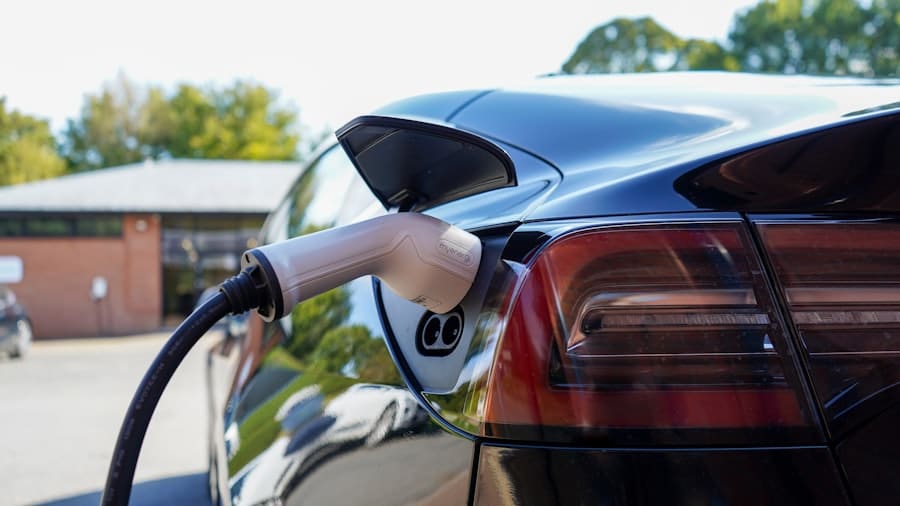The automotive market has witnessed a significant transformation over the past decade, with electric vehicles (EVs) emerging as a formidable force. This shift is not merely a trend but a response to a confluence of technological advancements, regulatory pressures, and changing consumer preferences. Major automotive manufacturers, including Tesla, Nissan, and General Motors, have invested heavily in electric vehicle technology, leading to an influx of models that cater to various segments of the market.
The introduction of high-performance electric cars, such as the Tesla Model S and the Porsche Taycan, has demonstrated that EVs can compete with traditional internal combustion engine vehicles in terms of speed, range, and luxury. The rise of electric cars is also fueled by the growing availability of charging infrastructure. Governments and private companies are investing in charging stations to alleviate range anxiety, a common concern among potential EV buyers.
As charging networks expand, consumers are increasingly recognizing the practicality of owning an electric vehicle. Furthermore, advancements in battery technology have led to longer ranges and shorter charging times, making electric cars more appealing than ever. The combination of these factors has catalyzed a shift in consumer attitudes, propelling electric vehicles into the mainstream automotive market.
Key Takeaways
- Electric cars are gaining popularity in the automotive market due to advancements in technology and environmental concerns.
- Consumer attitudes and perceptions toward electric cars are influenced by factors such as range anxiety, charging infrastructure, and cost.
- Environmental awareness plays a significant role in shaping consumer sentiment toward electric cars, with many consumers prioritizing sustainability.
- Addressing consumer concerns and misconceptions about electric cars, such as battery life and performance, is crucial for increasing adoption.
- Government incentives and policies, along with effective marketing and education, are key in shaping consumer perception and driving future sentiment toward electric cars.
Understanding Consumer Attitudes and Perceptions Toward Electric Cars
Consumer attitudes toward electric cars are shaped by a myriad of factors, including personal values, environmental concerns, and perceptions of technology.
However, there remains a significant portion of the population that harbors skepticism about the reliability and performance of EVs.
This dichotomy in perception highlights the complexity of consumer attitudes toward electric cars. Surveys indicate that while many consumers express interest in electric vehicles, their willingness to purchase one often hinges on specific concerns. For instance, potential buyers may question the availability of charging stations or worry about the longevity of battery life.
Additionally, cultural factors play a role; in regions where traditional vehicles dominate the roads, the adoption of electric cars may be slower due to entrenched habits and preferences. Understanding these nuanced attitudes is crucial for manufacturers and policymakers aiming to promote electric vehicle adoption.
Factors Influencing Consumer Decision-Making When Considering Electric Cars

Several key factors influence consumer decision-making when it comes to purchasing electric vehicles. One of the most significant considerations is cost. While the initial purchase price of electric cars has historically been higher than that of conventional vehicles, this gap is narrowing as technology advances and production scales up.
Consumers are increasingly aware of the total cost of ownership, which includes savings on fuel and maintenance over time. This long-term perspective can make electric vehicles more attractive financially. Another critical factor is performance.
Many consumers are concerned about how electric cars compare to their gasoline counterparts in terms of acceleration, handling, and overall driving experience. The performance capabilities of modern electric vehicles have dispelled many myths surrounding their inferiority; for example, the instant torque provided by electric motors often results in quicker acceleration than traditional engines. Additionally, features such as regenerative braking enhance the driving experience while contributing to energy efficiency.
As consumers become more informed about these aspects, their willingness to consider electric vehicles increases.
The Impact of Environmental Awareness on Consumer Sentiment Toward Electric Cars
Environmental awareness has become a pivotal driver in shaping consumer sentiment toward electric vehicles. As climate change and environmental degradation gain prominence in public discourse, many individuals are seeking ways to reduce their carbon footprint. Electric cars are often perceived as a more sustainable alternative to traditional vehicles, which rely on fossil fuels and contribute significantly to greenhouse gas emissions.
This growing consciousness around environmental issues has led to an increase in demand for cleaner transportation options. Moreover, the rise of social media and digital platforms has amplified discussions about sustainability and eco-friendly practices. Consumers are more informed than ever about the environmental impact of their choices, leading to a greater inclination toward products that align with their values.
Electric vehicles are frequently marketed as part of a broader commitment to sustainability, appealing to environmentally conscious consumers who wish to make responsible choices. This alignment between consumer values and product offerings is crucial for manufacturers aiming to capture this growing market segment.
Addressing Consumer Concerns and Misconceptions About Electric Cars
Despite the positive trends surrounding electric vehicle adoption, several misconceptions persist that can hinder consumer acceptance. One prevalent concern is related to battery life and replacement costs. Many potential buyers fear that they will need to replace their vehicle’s battery after a few years at a significant expense.
Educating consumers about these developments can help alleviate fears regarding battery longevity. Another common misconception is that electric cars lack performance capabilities compared to traditional vehicles.
This belief can be countered by showcasing real-world examples of high-performance electric cars that have garnered acclaim for their speed and handling. For instance, the Tesla Model 3 has received praise for its impressive acceleration and driving dynamics, challenging the notion that electric vehicles are inherently inferior in performance. By addressing these misconceptions through targeted marketing and educational initiatives, manufacturers can foster greater acceptance among skeptical consumers.
Government Incentives and Policies Shaping Consumer Sentiment Toward Electric Cars

Government incentives play a crucial role in shaping consumer sentiment toward electric vehicles. Many countries have implemented tax credits, rebates, and grants aimed at reducing the financial burden associated with purchasing an EV. For example, in the United States, federal tax credits can provide up to $7,500 off the purchase price of an electric vehicle, making them more financially accessible for consumers.
Additionally, some states offer additional incentives that further enhance the appeal of EVs. Beyond financial incentives, government policies aimed at reducing emissions also influence consumer behavior. Regulations mandating lower emissions from new vehicles encourage manufacturers to invest in electric vehicle technology while simultaneously nudging consumers toward greener options.
The establishment of low-emission zones in urban areas further incentivizes the adoption of electric cars by restricting access for traditional gasoline-powered vehicles. These policies create an environment conducive to electric vehicle adoption by aligning economic benefits with environmental goals.
The Role of Marketing and Education in Shifting Consumer Perception of Electric Cars
Effective marketing strategies and educational initiatives are essential for shifting consumer perceptions about electric vehicles. Manufacturers must communicate not only the benefits of owning an EV but also address common concerns head-on. Campaigns that highlight real-world experiences from current EV owners can be particularly persuasive; testimonials showcasing cost savings on fuel and maintenance can resonate with potential buyers.
Education also plays a vital role in dispelling myths surrounding electric vehicles. Workshops, informational websites, and community events can provide consumers with valuable insights into the technology behind EVs, charging infrastructure, and environmental benefits. By fostering an informed consumer base, manufacturers can create a more favorable environment for electric vehicle adoption.
Collaborations with environmental organizations can further enhance credibility and reach among eco-conscious consumers.
Predicting the Future of Consumer Sentiment Toward Electric Cars
As we look ahead, it is clear that consumer sentiment toward electric vehicles is poised for continued growth. The convergence of technological advancements, increased environmental awareness, and supportive government policies suggests a future where electric cars become increasingly mainstream. As battery technology continues to improve, we can expect longer ranges and faster charging times to become standard features across various models.
Moreover, as younger generations enter the car-buying market with heightened environmental consciousness and tech-savvy mindsets, their preferences will likely drive demand for electric vehicles even further. The integration of smart technology into EVs—such as autonomous driving features—will also appeal to tech-oriented consumers who prioritize innovation in their purchasing decisions. Overall, the trajectory indicates a promising future for electric vehicles as they become an integral part of the automotive landscape.
In the realm of technological advancements and consumer preferences, the exploration of consumer sentiment toward electric cars is a fascinating topic that aligns with the broader trend of innovation in personal technology. A related article that delves into the nuances of consumer choices in technology is What Makes the Google Pixel Phone Different?. This article provides insights into how unique features and technological advancements can influence consumer preferences, much like the factors that affect the adoption of electric vehicles. Understanding these dynamics can offer a comprehensive view of how innovation drives consumer sentiment across different sectors.
FAQs
What is consumer sentiment toward electric cars?
Consumer sentiment toward electric cars refers to the overall feelings, attitudes, and opinions that consumers have about electric vehicles. This includes their perceptions of electric cars’ performance, cost, environmental impact, and overall desirability.
What factors influence consumer sentiment toward electric cars?
Consumer sentiment toward electric cars can be influenced by a variety of factors, including the availability of charging infrastructure, government incentives, the range of electric vehicles, the cost of ownership, and the environmental benefits of electric cars.
How is consumer sentiment toward electric cars measured?
Consumer sentiment toward electric cars can be measured through surveys, focus groups, and market research studies. These methods help to gauge consumer attitudes, preferences, and intentions related to electric vehicles.
What are some common perceptions of electric cars among consumers?
Common perceptions of electric cars among consumers include concerns about range anxiety, the availability of charging stations, the initial cost of purchasing an electric vehicle, and the environmental benefits of driving an electric car.
How does consumer sentiment toward electric cars impact the automotive industry?
Consumer sentiment toward electric cars can have a significant impact on the automotive industry, influencing the development of new electric vehicle models, the expansion of charging infrastructure, and the implementation of government policies and incentives to promote electric car adoption.

